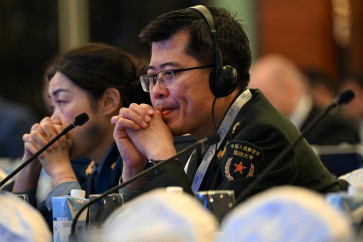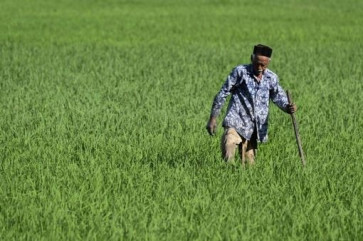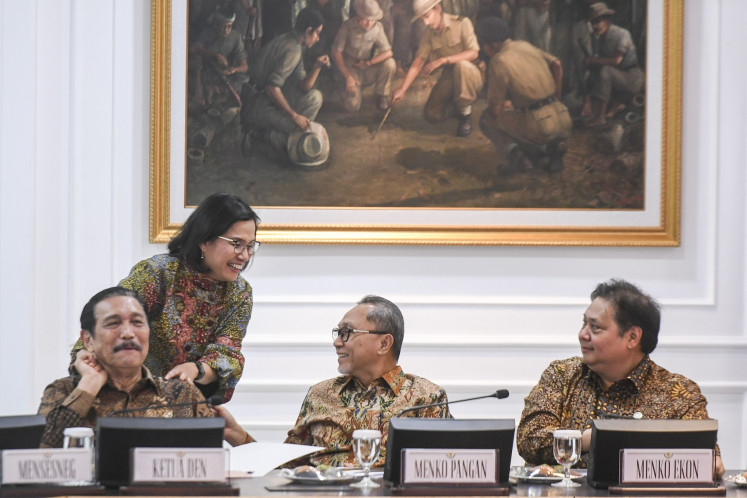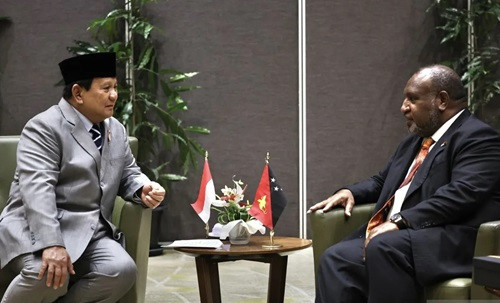Aqua unveils country’s first 100 percent recycled plastic bottles
PT Tirta Investana, the producer of Danone Aqua bottled water, Indonesia’s oldest and largest bottled water brand, recently introduced plastic water bottles made of 100 percent recycled material, the first such innovation in the country
Change text size
Gift Premium Articles
to Anyone

P
T Tirta Investana, the producer of Danone Aqua bottled water, Indonesia’s oldest and largest bottled water brand, recently introduced plastic water bottles made of 100 percent recycled material, the first such innovation in the country.
The new packaging was unveiled during the 2018 Our Ocean Conference (OOC) in Nusa Dua, Bali, last week, where various stakeholders gathered to discuss efforts to preserve the world’s oceans.
The new bottle also boasts a simpler look that abandoned the recognizable blue plastic band wrapped around the previous version of Aqua bottles, and instead has its brand name embossed directly onto the plastic.
The bottles are made of 100 percent recycled polyethylene terephthalate (PET), which, according to the company, means the new bottles will not use any virgin plastic. The innovation also ensures that no additional plastic is used to create the new containers.
Tirta Investama president director Corine Tap said the innovation aimed at reaching Aqua’s target to “collect more plastic than is produced by 2025, with the ultimate goals of using 50 percent recycled PET in 2025”.
The production process of the new bottles, she said, also reduced the company’s carbon footprint.
“In particular, we use this project for education; to bring awareness to the Indonesian consumers to be wiser in using plastic and understanding that making choices can actually make an impact on the world they want to live in. Now, they have the option to buy a product that uses 100 percent recycled plastic.”
The new Aqua bottles will officially hit the market in Bali in December, followed by Jakarta and other big cities in early 2019.
But activists and civil society organizations have used the 2018 OOC to emphasize that “recycling alone is never enough to combat marine pollution”.
A recent Greenpeace report also found that only 2 percent of 141 million tons of global plastic waste in 2015 was effectively recycled.
According to the study, the recycling rate in developed countries with more advanced waste management systems rarely reached 50 percent.
In response, Corine said Aqua’s new bottle was part of the campaign #BijakBerplastik (Use Plastic Wisely), which went beyond recycling because it covered three main factors that could help reduce plastic waste: product innovation, consumers education and the development of waste collection infrastructure.
“It’s not just about recycling; it is also about innovating the packaging material, [and] it is about building circularity and avoiding leakage in landfills,” she said.
“We believe that’s possible and that’s what we have been doing for so many years and we will continue to do so to close the loop.”
Danone Aqua’s director for sustainable development Karyanto Wibowo said recycling was one the most important tools in managing plastic waste.
“It is only that recycling [alone] is not enough and I agree with that. But recycling is one of the important solutions of the 3R principles: reduce, reuse and recycle,” he said.
“[And] if our [company] is the only to use 100 percent recycled bottles, then the impact will be less significant. But if everyone uses this design, then the impact will be significant and there will be no plastic waste.”
Corine, meanwhile, declined to reveal the price of the new products, confirming only that Aqua’s new bottled water would cost more than regular bottled water.
“For now, we will have a small-scale launch, so in this case, [the product] will always be more expensive than if you launch something throughout the entire country,” she said.
“But the point for us is not the production cost but the value of educating the public, raising awareness [about recycling] and also bringing new technology and innovation to the market.”









